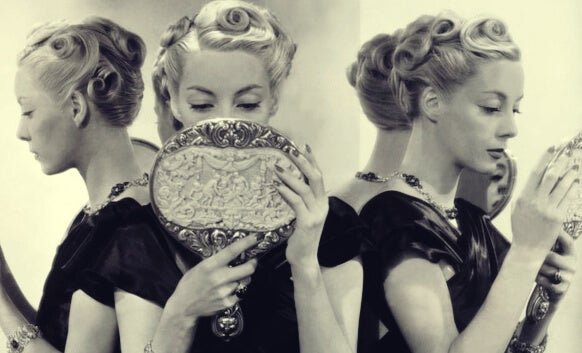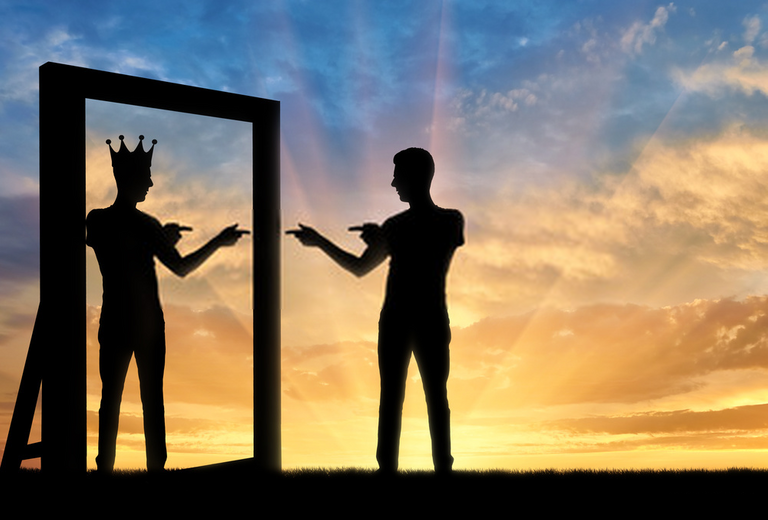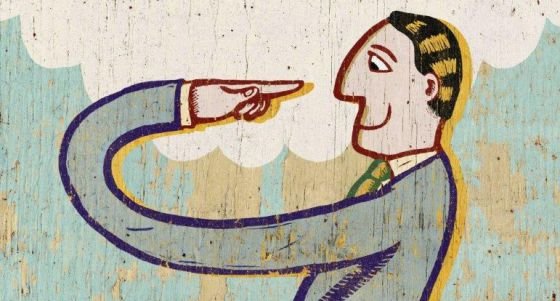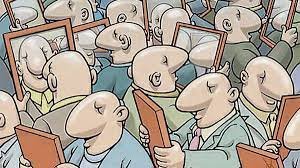Autoestima sobreelevada – narcisismo "La soberbia no es grandeza sino hinchazón; y lo que está hinchado parece grande pero no está sano". San Agustín (Obispo y filósofo). Una persona con esta clase de autoestima es aquella que se cree superior a los demás y piensa que no necesita de nadie para cumplir sus ideales, otras de las características de un individuo que actúa bajo este tipo de autoestima son: • Ego muy alto, con necesidad de ser elogiado y reconocido. • Siente que merece más que los demás. • Le gusta imponer su punto de vista porque siempre cree tener la razón. • Es una persona egocéntrica, que todo gira alrededor de él. • Siente que puede mirar a los demás con desprecio. • Es arrogante y cree que los que están a su alrededor deben rendirle pleitesía. La visión tradicional de la Alta Autoestima equiparaba alta autoestima con lo sano y deseable, sin embargo, a pesar de lo que se creía en principio, la autoestima sobreelevada se relaciona más con la autoestima baja.

Over-elevated self-esteem - narcissism. "Pride is not greatness but swelling; and what is swollen appears great but is not healthy." St. Augustine (Bishop and philosopher). A person with this kind of self-esteem is one who believes he is superior to others and thinks he does not need anyone to fulfill his ideals, other characteristics of an individual who acts under this kind of self-esteem are: - Very high ego, with a need to be praised and recognized. - Feels that he/she deserves more than others. - Likes to impose his point of view because he always believes he is right. - He is an egocentric person, that everything revolves around him. - He feels he can look down on others. - He is arrogant and believes that those around him should pay obeisance to him. The traditional view of high self-esteem equated high self-esteem with healthy and desirable, however, despite what was originally believed, high self-esteem is more related to low self-esteem.

Autoestima
| Alta | Media | Sobreelevada | Baja |
|---|---|---|---|
| Confianza | Apego | Inseguridad | Apatía |
| Autoaceptación | Dependencia | Dependencia | Inseguridad |
| Responsabilidad | Discriminación | Falta de Confianza | Minusvalía |
| Compromiso | Inseguridad | Exageradas | Culpa |
Parte del problema, es originado por la visión tradicional de la Autoestima y se debió a que los instrumentos de evaluación más utilizados no discriminaban entre alta Autoestima sana y narcisismo. Y realmente se relaciona más con autoestima baja. Con frecuencia, cuando vemos a una persona exigir las cosas a otra persona, es común pensar que tiene toda la razón, y que demostrarle al mundo sus logros y cualidades, en ocasiones de manera exagerada y repetitiva, pensamos que tiene muy buena autoestima. Sin embargo, en algunos casos, las personas que se repiten así mismos y a los demás las cualidades y virtudes que poseen, pueden tener baja autoestima y tratar de compensar el hecho de sentirse poco importantes por medio de la exageración de las cualidades, aun cuando se considere que no las posea. Se podría decir que, al aplicar los instrumentos psicológicos de evaluación, no se consideraron que las personas con niveles de autoestima elevados, tenían graves problemas en su funcionamiento y en su forma de relacionarse con los demás. Es decir, había un “lado oscuro” en la autoestima sobre elevada. Se halló que personas que aparecían como poseedoras de autoestima sobre elevada, según los cuestionarios más utilizados, eran: • Egocéntricas, arrogantes y prepotentes. • Distorsionaban la realidad para inflar su autoimagen • Reaccionaban con ira o violencia ante amenazas a su "autoestima” • Dominaban o subyugaban a sus semejantes.

Part of the problem was caused by the traditional view of self-esteem and was due to the fact that the most commonly used assessment instruments did not discriminate between high healthy self-esteem and narcissism. And it is really more related to low self-esteem. Often, when we see a person demanding things from another person, it is common to think that he/she is absolutely right, and showing the world his/her achievements and qualities, sometimes in an exaggerated and repetitive way, we think that he/she has very good self-esteem. However, in some cases, people who repeat to themselves and to others the qualities and virtues they possess, may have low self-esteem and try to compensate for the fact of feeling unimportant by exaggerating the qualities, even when it is considered that they do not possess them. It could be said that, when applying the psychological evaluation instruments, it was not considered that people with high levels of self-esteem had serious problems in their functioning and in their way of relating to others. In other words, there was a "dark side" to high self-esteem. It was found that people who appeared as having over-high self-esteem, according to the most commonly used questionnaires, were: - Egocentric, arrogant and overbearing. - Distorted reality to inflate their self-image. - They reacted with anger or violence in the face of threats to their "self-esteem". - They dominated or subjugated their peers.

Cuando la autoestima no está equilibrada, puede dispararse en cualquier dirección. Con esto nos referimos a que la autoestima, no equilibrada, puede ir de un punto a otro dependiendo de las emociones del momento. También existen los casos en que las personas tienen buena autoestima en un área, pero no en otras; por ejemplo, buena autoestima respecto a su trabajo, pero no frente a su físico o viceversa. Tal y como la admiración de las otras personas no genera seguridad, ni el conocimiento ni las habilidades desarrolladas, tampoco las cosas materiales que poseemos, ni el matrimonio, la paternidad, tampoco el hacer obras de caridad, ni las cirugías estéticas, este tipo de cosas, o circunstancias son satisfacciones temporales, que generan gratificación, pero no autoestima. Sucede que las personas buscan la autoconfianza y la seguridad en otras personas, cuando eso únicamente lo podemos encontrar es en el interior de nosotros, es por esa razón que fallan al buscar, y esto inevitablemente repercute en la autoestima. Pensamos erradamente, que con solo lograr que las demás personas tengan una impresión positiva de nosotros, tendremos una opinión positiva de nosotros mismos, pues entonces dejaríamos de decir: “si pudiera tener una esposa, si pudiera tener una casa, si pudiera tener una amante, si pudiera tener otras cosas, entre otros supuestos…” Los seres humanos, siempre buscan el reconocimiento, ser aceptados para lograr la autorrealización.

When self-esteem is not balanced, it can go off in any direction. By this we mean that unbalanced self-esteem can go from one point to another depending on the emotions of the moment. There are also cases in which people have good self-esteem in one area, but not in others; for example, good self-esteem with respect to their work, but not with respect to their physique, or vice versa. Just as the admiration of other people does not generate security, nor does knowledge or developed skills, nor the material things we possess, nor marriage, parenthood, nor charity work, nor cosmetic surgeries, these types of things, or circumstances are temporary satisfactions, which generate gratification, but not self-esteem. It happens that people look for self-confidence and security in other people, when we can only find it within ourselves, that is why they fail to look for it, and this inevitably affects self-esteem. We mistakenly think that just by getting other people to have a positive impression of us, we will have a positive opinion of ourselves, because then we would stop saying: "if I could have a wife, if I could have a house, if I could have a lover, if I could have other things, among other assumptions ...".
Human beings, always seek recognition, to be accepted in order to achieve self-realization.

Pasando a darle amor a tu post #malomilove 💙😄
Bellisima, Graciasss... @malomi
Congratulations @mahuampionlinemg! You have completed the following achievement on the Hive blockchain and have been rewarded with new badge(s) :
Your next target is to reach 700 upvotes.
You can view your badges on your board and compare yourself to others in the Ranking
If you no longer want to receive notifications, reply to this comment with the word
STOPCheck out the last post from @hivebuzz:
Support the HiveBuzz project. Vote for our proposal!
Buenísimo
Graciassss ❤💚💜🖤